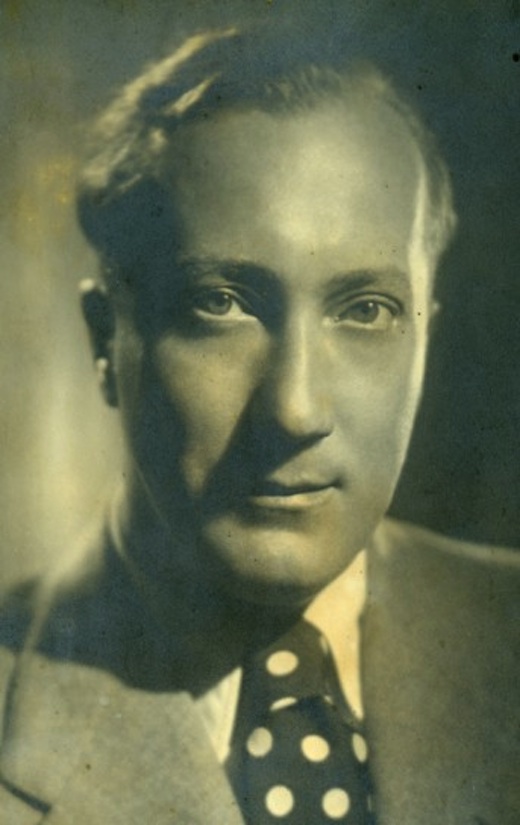
Bruno Balz
Bruno Balz (6 October 1902, in Berlin – 14 March 1988, in Bad Wiessee) was a German songwriter and schlager writer. From the time he wrote the music for the first German sound film until his retirement in the 1960s, Balz was responsible for the lyrics to over a thousand popular hits. Much of his output was in conjunction with the composer Michael Jary; their songs helped make the singer Zarah Leander popular. Balz was arrested several times for homosexuality. In 1936, he spent several months in prison, and was released under an agreement that mandated that his name was no longer to appear in public. To maintain the appearance of propriety, he entered a "lavender marriage" with a woman named Selma. He was rearrested in 1941 by the Gestapo and was kept in the Gestapo headquarters in Prinz-Albrecht-Straße. He was released from imprisonment by the intervention of Jary, who persuaded officials that he could produce songs that would aid the war effort. Within a day of his release, they had written two of their greatest successes, "Davon geht die Welt nicht unter" ("This Will Not End the World") and "Ich weiß, es wird einmal ein Wunder gescheh'n" ("I Know Some Day a Miracle Will Happen"). His film songs for Leander, a star of UFA musicals which were later criticised as having helped public and armed forces morale during the war, became anthems for homosexuals imprisoned in concentration camps. The fall of the Nazi regime did not spell an end to the persecution of Balz, as Paragraph 175, the law against homosexuality, continued in force. Thus his name is considerably less well-known than if he had been properly credited for his lyrics. Balz's companion was painter and actor Jürgen Draeger, who was enjoined by a clause in Balz's will from talking about their relations for ten years following Balz's death. The Bruno Balz Theatre in Berlin is named for him. |
Birth and Death Data: Born October 6, 1902 (Berlin), Died March 14, 1988 (Bad Wiessee)
Date Range of DAHR Recordings: 1935 - 1950
Roles Represented in DAHR: lyricist, songwriter
 = Recordings are available for online listening.
= Recordings are available for online listening.
 = Recordings were issued from this master. No recordings issued from other masters.
= Recordings were issued from this master. No recordings issued from other masters.
Recordings
| Company | Matrix No. | Size | First Recording Date | Title | Primary Performer | Description | Role | Audio |
|---|---|---|---|---|---|---|---|---|
| Columbia | CO42923 | 10-in. | 1950 | Die fett polka | Erwin Hartung ; Willi Stanke Tanzorchester | Jazz/dance band, with male vocal solo | lyricist | |
| Gramophone | 0RA903 | 10-in. | 11/21/1935 | Wie ein Wunder kam die Liebe über Nacht | Bruno Seidler-Winkler ; Wiener Tanzorchester | Jazz/dance band, with vocal | lyricist | |
| Gramophone | 0RA913 | 10-in. | 11/28/1935 | Del album de mis ensueños | Robert Gaden Orchestra | Jazz/dance band | songwriter | |
| Gramophone | 0RA1829 | 10-in. | 2/12/1937 | Das Fensterln in der Nacht | Orchester Will Glahé | Instrumental ensemble, with male vocal solo | lyricist | |
| Gramophone | 0RA2573 | 10-in. | 1/12/1938 | Die Welt wird schöner mit jedem Glas | Orchester Will Glahé | Instrumental ensemble, with vocal | songwriter | |
| Gramophone | 0RA2574 | 10-in. | 1/12/1938 | Tanze und sing! | Orchester Will Glahé | Instrumental ensemble, with vocal | lyricist | |
| Gramophone | 0RA2575 | 10-in. | 1/12/1938 | Puppen parade | Orchester Will Glahé ; Schuricke-Terzett | Instrumental ensemble, with male vocal trio | lyricist | |
| Gramophone | 0RA2628 | 10-in. | 2/3/1938 | Das ist Berlin | Orchester Will Glahé | Instrumental ensemble, with male vocal trio | songwriter | |
| Gramophone | 0RA2763 | 10-in. | 3/24/1938 | Haben sie den neuen Hut von Fräulein Molly schon gesehen? | Orchester Will Glahé | Instrumental ensemble, with female-male vocal duet | lyricist | |
| Gramophone | 0RA2764 | 10-in. | 3/24/1938 | Nur das Lachen nicht verlernen | Orchester Will Glahé | Instrumental ensemble, with vocal | songwriter | |
| Gramophone | 0RA3388 | 10-in. | November 1938 | So kann das ruhig weitergeh'n | Hans Carste Orchestra | Jazz/dance band, with vocal | songwriter | |
| Gramophone | 0RA3916 | 10-in. | 1939 | Viel Glück | Goldene Sieben ; Elena Lauri | Female vocal solo, with jazz/dance band | lyricist |
Citation
Discography of American Historical Recordings, s.v. "Balz, Bruno," accessed November 22, 2024, https://adpprod2.library.ucsb.edu/names/101333.
Balz, Bruno. (2024). In Discography of American Historical Recordings. Retrieved November 22, 2024, from https://adpprod2.library.ucsb.edu/names/101333.
"Balz, Bruno." Discography of American Historical Recordings. UC Santa Barbara Library, 2024. Web. 22 November 2024.
DAHR Persistent Identifier
Linked Open Data Sources
LCNAR: Balz, Bruno, 1902-1988 - http://id.loc.gov/authorities/names/n2008072015
Wikidata: Bruno Balz - http://www.wikidata.org/entity/Q86567
VIAF: http://viaf.org/viaf/72458667
MusicBrainz: Bruno Balz - https://musicbrainz.org/artist/44c9283a-e24f-417c-9933-47c0b02421ef
Wikipedia content provided under the terms of the Creative Commons BY-SA license
Feedback
Send the Editors a message about this record.
